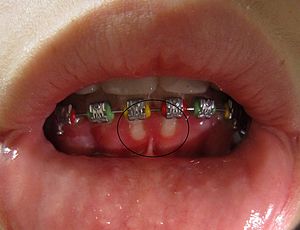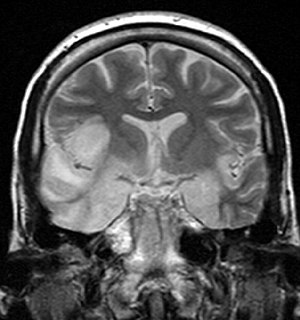Herpes
Herpes simplex, commonly known as herpes, is a viral infection caused by the herpes simplex virus (HSV). The disease is characterised by the site of infection, predominantly affecting the mouth or genitalia. Two major types of HSV are HSV-1, which typically causes oral herpes, and HSV-2, which usually leads to genital herpes.
Signs and Symptoms
HSV infection manifests in various forms. Oral herpes involves the face or mouth, leading to small blisters often referred to as cold sores or fever blisters. Genital herpes affects the genitalia, forming blisters that break open and turn into small ulcers. These symptoms usually resolve within two to four weeks. In addition to blisters, symptoms may include fever, muscle pains, swollen lymph nodes, and headaches. Other forms of HSV infection can affect different parts of the body, such as herpetic whitlow (fingers or thumb), herpes simplex keratitis (eye), herpesviral encephalitis (brain), and neonatal herpes (newborns).

Pathophysiology
After initial infection, HSV becomes latent in sensory nerves, residing there lifelong. Recurrence of symptoms can be triggered by factors such as decreased immune function, stress, and sunlight exposure. HSV is transmitted through direct contact with infected body fluids or lesions. Asymptomatic shedding occurs in many infected individuals, contributing to the spread of the virus even when symptoms are absent.

Diagnosis
Diagnosing HSV is based on clinical presentation and can be confirmed through laboratory tests such as PCR, viral cultures, and blood tests for HSV antibodies. Primary infection often presents with distinctive sores and acute gingivitis, especially in orofacial herpes. However, diagnosing genital herpes can be challenging due to the similarity of symptoms with other conditions, such as fungal infections and dermatitis.
Treatment
While there is no cure for HSV, antiviral medications like aciclovir and valaciclovir can reduce the severity and frequency of outbreaks. Analgesics and topical anaesthetics such as lidocaine can alleviate pain and itching. For severe complications, antiviral therapy is very important to manage symptoms and prevent further spread.

Prevention
Preventing HSV transmission involves avoiding direct contact with infected lesions and body fluids. Condom use significantly reduces, but does not eliminate, the risk of genital herpes transmission. For pregnant women with HSV, antiviral therapy and elective caesarean sections can reduce the risk of neonatal herpes. Daily antiviral medication for infected individuals can also decrease the likelihood of transmission to uninfected partners.
Epidemiology
HSV-1 and HSV-2 are widespread, with global infection rates between 60% and 95% for adults. HSV-1 is typically acquired during childhood, while HSV-2 is more common in adults, especially in populations with lower socioeconomic status. Most HSV-2-infected individuals are unaware of their infection, which underscores the need for better diagnostic and public health measures.
Signs and Symptoms of Specific Types
Herpetic Gingivostomatitis
Often the initial presentation of HSV infection, it is more severe than herpes labialis and is characterised by inflamed papules and vesicles around the mouth.

Herpes Labialis
Recurrent HSV-1 infection presenting as cold sores on the lips.

Herpes Genitalis
Clusters of inflamed papules and vesicles on the genitalia.

Herpetic Whitlow and Herpes Gladiatorum
Painful infection affecting the fingers or thumbs, and sometimes the toes or nail cuticle.

Herpesviral Encephalitis and Herpesviral Meningitis
Life-threatening conditions caused by HSV-1 and HSV-2, respectively.

Herpes Esophagitis
Characterised by painful and difficult swallowing, often in immunocompromised individuals.

Self-assessment MCQs (single best answer)
Which virus is responsible for causing herpes?
Which type of HSV typically causes oral herpes?
What are the common symptoms of oral herpes?
Which factor is NOT mentioned as a trigger for the recurrence of HSV symptoms?
How is HSV primarily transmitted?
Which diagnostic method is NOT used for confirming HSV infection?
Which medication is commonly used to reduce the severity and frequency of HSV outbreaks?
Which preventive measure is NOT effective in reducing HSV transmission?
What is the term for HSV infection that affects the fingers or thumbs?
Which form of HSV infection is characterised by life-threatening inflammation of the brain?
Dentaljuce
Dentaljuce provides Enhanced Continuing Professional Development (CPD) with GDC-approved Certificates for dental professionals worldwide.
Founded in 2009 by the award-winning Masters team from the School of Dentistry at the University of Birmingham, Dentaljuce has established itself as the leading platform for online CPD.
With over 100 high-quality online courses available for a single annual membership fee, Dentaljuce offers comprehensive e-learning designed for busy dental professionals.
The courses cover a complete range of topics, from clinical skills to patient communication, and are suitable for dentists, nurses, hygienists, therapists, students, and practice managers.
Dentaljuce features Dr. Aiden, a dentally trained AI-powered personal tutor available 24/7 to assist with queries and provide guidance through complex topics, enhancing the learning experience.
Check out our range of courses, or sign up now!


